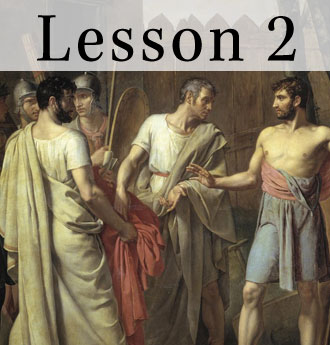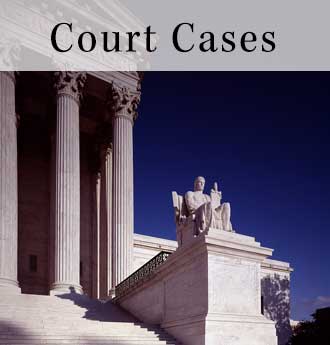Lesson 2: What Ideas about Civic Life Informed the Founding Generation?
Cicero (106-43) Marcus Tullius Cicero was an orator, a lawyer, a politician, and a philosopher whose life coincided with the decline and fall of the Roman Republic. Elected to each of the major offices in Roman government, including senator and consul, Cicero was exiled in 58 BC. During his eleven-year exile he wrote extensively about politics and philosophy, much of his work focusing on the defense and improvement of the Roman Republic. Cicero's De Officiis, a profound meditation on morality and moral duty, including moral principles as applied to public life, deeply influenced Western civilization since its writing in 44 BC. De Officiis was so influential that when the printing press was invented, it was the second book to be printed after the Bible. Cicero, echoing the views of Stoic philosophy, argued for self-restraint and limits to action for the sake of self-interest. He argued that what is honorable and what is expedient cannot ever rightly be said to conflict. What is honorable must always be chosen, and some actions, even to save the state, are so morally abhorrent that they must be rejected. In the sixteenth century Machiavelli directly contradicted these ideas and argued that to establish, maintain, and expand their power, rulers must be taught "how not to be good."
Hobbes, Thomas (1588-1679) Thomas Hobbes, a philosopher of materialism, fled to France during English civil war (1642-1651, which pitted Parliament against the Crown), where he wrote Leviathan. This book argued that humans without government live in a "state of nature," which is a "state of war" of against all. Life in such conditions is "solitary, poor, nasty, brutish, and short." Thus in a state of nature all fear violent death, and violent death is what people fear most. To avoid violent death, they agree to set up a state with strict authority and the power to protect life. People agree to leave this state of nature through "social contract" and to give all power to the Leviathan state, which Hobbes characterized as a "mortal god." Hobbes was accused of atheism for the views he expressed in Leviathan, where Hobbes pilloried various theological ideas. The English Parliament asserted that Leviathan helped cause the plague of 1665 and the Great Fire of 1666. The book was placed on the Index of Forbidden Books by the Catholic Church because it undermined the theory of divine right of kings.
Locke, John (1632-1704) John Locke, a physician and philosopher, worked with famous scientists, including Robert Boyle and Robert Hooke. In contrast to Hobbes, Locke used state of nature and social contract theory to justify limited government and the preservation of individual rights, particularly life, liberty, and property. Locke is sometimes called "America's philosopher" because his Second Treatise of Government (1690) was widely read by the colonists and important ideas found in it (as well as in works of English republican writers) are found in the Declaration of Independence, especially his theories of natural rights and his defense of violent revolution after "a long train of abuses" of power by rulers. Two verbatim phrases of Locke's are found in the Declaration.
Washington, George (1732-1799) George Washington was born in Virginia in 1732. He grew up there on several plantations along the Potomac and Rappahannock Rivers. He was not particularly well educated, but did learn surveying. In 1753, he began his service to the country, which was to continue throughout his life, despite his desire to live a more private existence. Washington's efforts as commander of the Continental Army are well known. After the Treaty of Paris was signed in 1783, Washington returned to his home, Mount Vernon. Although he did not initially want to attend the Philadelphia Convention, his friends convinced him that his presence was necessary. He was elected president of the convention but spoke little. His presence and approval, however, were important. Nearly everyone assumed that Washington would be the first president of the United States, which, of course, he was, serving from 1789-1797.







